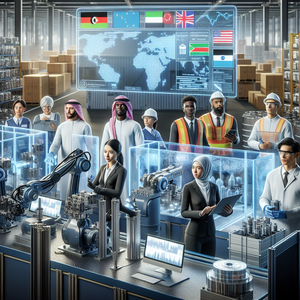
Top Careers Tackling Tariff Challenges: Building Resilient Supply Chains and Redefining Global Trade in a Complex World
The global trade landscape has entered an era of unprecedented complexity. What was once a straightforward exchange of goods is now heavily influenced by tariffs, trade restrictions, and geopolitical strategies. These evolving dynamics are driving up costs, creating bottlenecks in supply chains, and introducing operational uncertainties for industries as diverse as retail, aerospace, construction, and fashion. Tariffs, often intended as economic levers, now carry profound implications for businesses navigating the waters of global trade. In response, companies are turning to innovative strategies: diversifying supplier networks, renegotiating contracts to account for fluctuating costs, and embracing technology like AI-driven analytics to streamline operations. These challenges have also fueled a surge in demand for specialized professionals who possess the skills to adapt, innovate, and build resilient supply chains that can weather the storm of modern trade complexities. This article profiles the leading careers that are not only responding to the challenges of tariffs but are also actively shaping the future of global trade. Whether you're an aspiring professional or an experienced worker looking to pivot, we’ll explore roles that are critical to navigating tariff uncertainty. From supply chain strategists to sustainability officers, these careers represent the backbone of industries striving to thrive amidst the complexities of international commerce.
Job Summaries:
Tariff Compliance Specialist:
- Tariff compliance specialists ensure businesses adhere to international trade laws by analyzing trade agreements, calculating duties, and resolving disputes with customs officials.
- They safeguard company reputations and financial stability by ensuring legal compliance.
Customs Broker:
- Customs brokers act as intermediaries in cross-border commerce, handling documentation, calculating tariffs, and ensuring goods move smoothly through customs.
- They minimize delays and prevent costly fines by addressing discrepancies in shipping documentation.
Policy Advisor (Trade Focus):
- Policy advisors specializing in trade analyze economic and political factors to provide insights and draft recommendations regarding tariffs and trade regulations.
- They influence decision-making and explore technologies like blockchain for transparency in trade agreements.
Supply Chain Manager:
- Supply chain managers develop strategies to navigate trade challenges, ensuring goods are delivered on time despite turbulent conditions.
- They optimize sourcing and logistics to reduce costs and improve efficiency.
Freight Forwarder:
- Freight forwarders coordinate the shipment of goods across borders, ensuring efficient delivery while handling logistics, customs, and tariff compliance.
- They save costs by rerouting shipments to avoid tariff-heavy regions.
Import/Export Specialist:
- Import/export specialists oversee international trade complexities, ensuring compliance with tariff regulations and coordinating documentation for smooth transactions.
- They play a vital role in maintaining operational efficiency.
Supply Chain Strategist:
- Supply chain strategists focus on long-term planning to optimize operations and mitigate tariff risks.
- They use market analysis and innovative solutions like nearshoring and automation to enhance supply chain resilience.
Data Analyst (Supply Chain Focus):
- Supply chain data analysts leverage tools like Tableau and Python to analyze trends, supplier performance, and inventory levels.
- They provide data-driven insights to improve efficiency and reduce costs.
Sustainability Officer (Supply Chain):
- Supply chain sustainability officers align operations with eco-friendly practices and compliance with environmental regulations.
- They balance green initiatives with tariff-induced cost pressures, promoting local sourcing and sustainability frameworks.
The modern trade environment, shaped by tariffs and geopolitical complexities, has created both challenges and opportunities. As businesses face increased operational costs and supply chain bottlenecks, the demand for professionals equipped to navigate these obstacles is at an all-time high. From supply chain managers ensuring operational efficiency to policy advisors shaping trade regulations, these roles are critical in helping organizations adapt to a volatile trade ecosystem. By pursuing relevant education, certifications, and hands-on experience, you can position yourself at the forefront of this dynamic field. Whether you’re drawn to the strategic planning of a supply chain strategist or the legal intricacies of a tariff compliance specialist, the opportunities to make a meaningful impact are vast. The future of global trade depends on skilled professionals who can turn challenges into opportunities and lead industries toward resilience and innovation. Now is the time to invest in these vital careers and shape the future of global commerce.
Explore More Jobs

